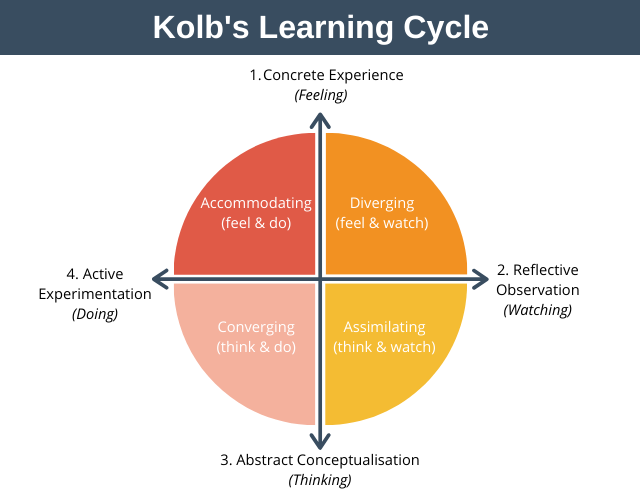e-Learning Ecologies MOOC’s Updates
Simulations & taking Experiential Learning to the New World
Multimodal meanings, refers to the idea that meaning can be created or shared via a variety of modes- by writing, drawing and with new media; through videos, pictures, by simulations. As discussed in this week's video, it is important to extend education to beyond more than just writing & drawing- given education is meant to be transferrable in practice in order for it to have yielded benefits, for the time spent learning.
Simulations are one such method that can be used to show that a learner has understood and is able to effectively apply this knowledge relevantly. Kolb's learning cycle- seen below, splits a the cycle of learning into experiencing a simulation/ learning intervention, reflecting on it, conceptualising it and then experimenting it. It is important to note here, that this is meant to happen in no particular order, per the theory.
A simulation can be used to present to a learner all of these dimensions- for e.g. to learn how to drive, a learner can be allowed to sit in the simulation of a car with all the of the equipment and 'have a play'. While adding some labels to the gear, the wheel, the brakes of the car may fasten learning, the real test would come when they've learnt to use all of these parts effetively to drive in a simulated environment. Effectively, the same simulation can also be used to understand how well the learner is able to apply their knowledge and skill, by allowing them to drive their simulated car (when they accomplish mastery) into various environments and are assessed to see if they've been able to stick to all the rules.
While the above example shows how someone can learn and be assessed on a simulation; perhaps another example could be to allow a student of hospitality to use their theoretical knowledge to redesign the layout of a simulated restaurant to manage customer flows, kitchen and be rated by the patrons and the employees of the restaurant. In this way, knowledge gained is experiential, is assessed in a real life environment, the learner is scaffolded by their theoretical knowledge and allowed to display their comprehension of these concepts by creating a simulation.
The only detractor for simulations is the cost of building one, however we all remember how expensive the first computers were when they first came out. This gives hope to those of us who believe that simulations in education will be path breaking sooner than later!
References:
https://expertprogrammanagement.com/2020/10/kolbs-learning-cycle/



Thanks for sharing Kolb's Learning Cycle that interests me much.
Especially I like the points of 'learning by doing' or hands-on learning.
Have you heard of the book 'Teaching for Conceptual Understanding in science' ?
https://my.nsta.org/resource/99138/teaching-for-conceptual-understanding-in-science
I haven't heard of it but I can see that it's a useful resource to understand learning, thank you Kazu for sharing!